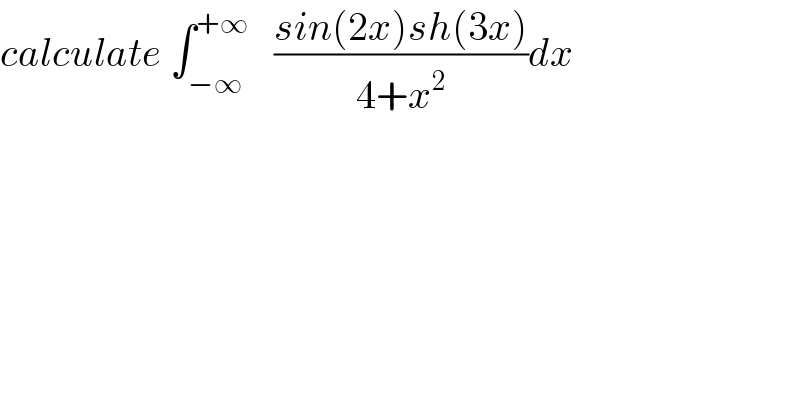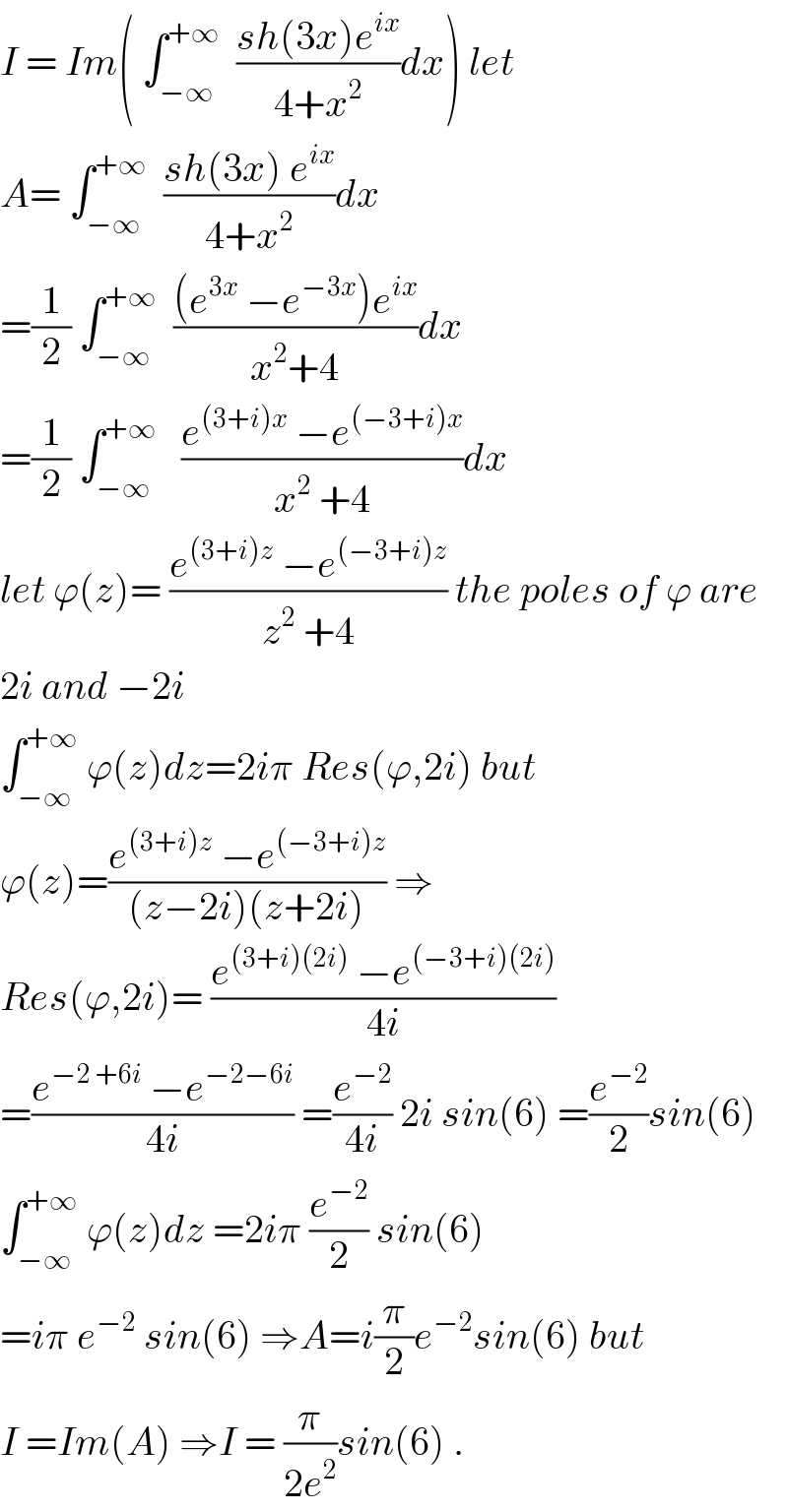Question Number 38468 by maxmathsup by imad last updated on 25/Jun/18

$${calculate}\:\int_{−\infty} ^{+\infty} \:\:\:\frac{{sin}\left(\mathrm{2}{x}\right){sh}\left(\mathrm{3}{x}\right)}{\mathrm{4}+{x}^{\mathrm{2}} }{dx} \\ $$
Commented by math khazana by abdo last updated on 27/Jun/18

$${I}\:=\:{Im}\left(\:\int_{−\infty} ^{+\infty} \:\:\frac{{sh}\left(\mathrm{3}{x}\right){e}^{{ix}} }{\mathrm{4}+{x}^{\mathrm{2}} }{dx}\right)\:{let} \\ $$$${A}=\:\int_{−\infty} ^{+\infty} \:\:\frac{{sh}\left(\mathrm{3}{x}\right)\:{e}^{{ix}} }{\mathrm{4}+{x}^{\mathrm{2}} }{dx} \\ $$$$=\frac{\mathrm{1}}{\mathrm{2}}\:\int_{−\infty} ^{+\infty} \:\:\frac{\left({e}^{\mathrm{3}{x}} \:−{e}^{−\mathrm{3}{x}} \right){e}^{{ix}} }{{x}^{\mathrm{2}} +\mathrm{4}}{dx} \\ $$$$=\frac{\mathrm{1}}{\mathrm{2}}\:\int_{−\infty} ^{+\infty} \:\:\:\frac{{e}^{\left(\mathrm{3}+{i}\right){x}} \:−{e}^{\left(−\mathrm{3}+{i}\right){x}} }{{x}^{\mathrm{2}} \:+\mathrm{4}}{dx} \\ $$$${let}\:\varphi\left({z}\right)=\:\frac{{e}^{\left(\mathrm{3}+{i}\right){z}} \:−{e}^{\left(−\mathrm{3}+{i}\right){z}} }{{z}^{\mathrm{2}} \:+\mathrm{4}}\:{the}\:{poles}\:{of}\:\varphi\:{are} \\ $$$$\mathrm{2}{i}\:{and}\:−\mathrm{2}{i}\: \\ $$$$\int_{−\infty} ^{+\infty} \:\varphi\left({z}\right){dz}=\mathrm{2}{i}\pi\:{Res}\left(\varphi,\mathrm{2}{i}\right)\:{but} \\ $$$$\varphi\left({z}\right)=\frac{{e}^{\left(\mathrm{3}+{i}\right){z}} \:−{e}^{\left(−\mathrm{3}+{i}\right){z}} }{\left({z}−\mathrm{2}{i}\right)\left({z}+\mathrm{2}{i}\right)}\:\Rightarrow \\ $$$${Res}\left(\varphi,\mathrm{2}{i}\right)=\:\frac{{e}^{\left(\mathrm{3}+{i}\right)\left(\mathrm{2}{i}\right)} \:−{e}^{\left(−\mathrm{3}+{i}\right)\left(\mathrm{2}{i}\right)} }{\mathrm{4}{i}} \\ $$$$=\frac{{e}^{−\mathrm{2}\:+\mathrm{6}{i}} \:−{e}^{−\mathrm{2}−\mathrm{6}{i}} }{\mathrm{4}{i}}\:=\frac{{e}^{−\mathrm{2}} }{\mathrm{4}{i}}\:\mathrm{2}{i}\:{sin}\left(\mathrm{6}\right)\:=\frac{{e}^{−\mathrm{2}} }{\mathrm{2}}{sin}\left(\mathrm{6}\right) \\ $$$$\int_{−\infty} ^{+\infty} \:\varphi\left({z}\right){dz}\:=\mathrm{2}{i}\pi\:\frac{{e}^{−\mathrm{2}} }{\mathrm{2}}\:{sin}\left(\mathrm{6}\right) \\ $$$$={i}\pi\:{e}^{−\mathrm{2}} \:{sin}\left(\mathrm{6}\right)\:\Rightarrow{A}={i}\frac{\pi}{\mathrm{2}}{e}^{−\mathrm{2}} {sin}\left(\mathrm{6}\right)\:{but}\: \\ $$$${I}\:={Im}\left({A}\right)\:\Rightarrow{I}\:=\:\frac{\pi}{\mathrm{2}{e}^{\mathrm{2}} }{sin}\left(\mathrm{6}\right)\:. \\ $$
